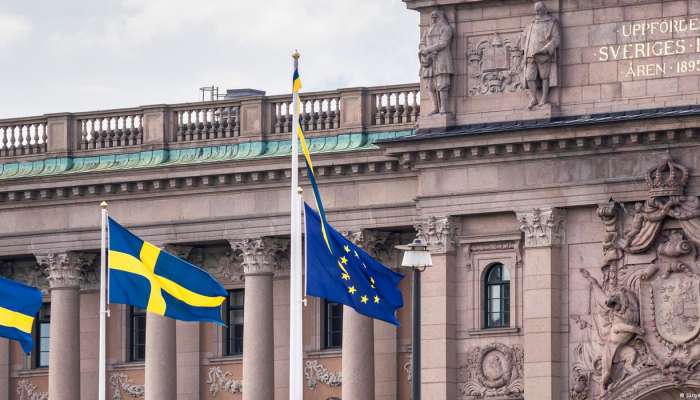
Brussels: When it comes to the rotating presidency of the Council of the European Union, Sweden's new minority government of the Moderate Party, Christian Democrats and the Liberals, which is reliant on support from the far-right Sweden Democrats, will continue where the Czech government left off.
Russia's war against Ukraine, its effects on security and energy supplies for all of Europe, and strengthening the EU's military capabilities and supply chains will be the overarching issues of Sweden's six months at the head of the Council of the European Union.
Stockholm will hold about 1,500 meetings of various EU bodies and spend countless hours negotiating compromises among the 27 member countries, the European Commission and the European Parliament.
Swedish Prime Minister Ulf Kristersson said the war in Ukraine would have decisive effects on his country's leadership of the Council of the European Union.
"In some respects we know exactly what these will be: maintaining European unity in our support for Ukraine; expanding the economic, humanitarian and military assistance to Ukraine; continuing to gather countries and resources for Ukraine's reconstruction; safeguarding international law; demanding accountability; and carefully monitoring Ukraine's progress as a candidate country," Kristersson told Swedish lawmakers in December. "In other respects, we have no idea what the repercussions will be. What will be happening a year after the invasion? Later in the spring or in the summer of 2023? During its presidency, Sweden will be prepared to act quickly and resolutely."
EU sceptic support
The war in Ukraine will overshadow other issues, including climate change, migration policy and accession talks with West Balkan states. When it comes to these other issues, Kristersson, who won power following parliamentary elections in September, will receive little support from his unpopular partners in the far-right Sweden Democrats.
The Sweden Democrats, led by Jimmie Akesson, got 20% of the vote in September's elections but did not become part of the government coalition. Akesson has denied climate change, pursued an anti-migration policy, and demonised the European Union as the root of all evil. These policies make the Sweden Democrats natural allies of other right-wing nationalist parties, including those currently governing in Hungary and Italy.
Kristersson said Sweden would protect the rule of law in all EU member countries, adding that steps taken against Hungary and Poland would be "moderately" pushed forward. The Sweden Democrats have rejected the penalties placed on Hungary, which include withholding EU funds until the country implements measures to protect the rule of law and fight corruption.
Green Party dissent
Jacop Dalunde, a member of the European Parliament whose Green Party is in Sweden's opposition, expressed his doubts about the government's plans for its presidency.
"That Kristersson still claims that he and his government will be able to contribute to the protection of the rule of law while dependent on the Swedish Democrats is both naive and extremely concerning," Dalunde told the Euractiv news site.
The Swedish government also plans to make progress on economic issues. Kristersson said the European auto industry deserves support in transitioning to electric vehicles. He also called for reducing dependency on Asian suppliers and parts makers.
'European semiconductor ecosystem'
Kristersson said he would not accept the subsidies Washington has said it will pay to US carmakers.
"During its presidency, Sweden will therefore lead the continuing work on a European semiconductor ecosystem," he told lawmakers. "This sounds technical — and it is. But it is also absolutely essential if we are to electrify our entire vehicle fleet."
Despite all the plans announced by Kristersson, Sweden's government faces enough political problems at home that it will not be particularly optimistic when it takes over the presidency of the Council of the European Union in January.
Organised crime growing
Though Sweden is perceived abroad as a peaceful and harmonious society, organised crime has become a problem for the country, Kristersson said in a somber Christmas speech. In 2022, there were 378 shootings killing 60 people and injuring 104 by mid-December, according to Swedish police statistics. Meanwhile, there were only four such deaths in Denmark and Norway and two in Finland.
As many people were shot in 2022 in Sodertalje, a city of about 72,000 people outside of Stockholm, as were in all of London for the year, Kristersson said. Most shootings involved young people, usually with migrant backgrounds, firing at people in other organised gangs, Kristersson said. Concerns over safety and the high number of murders have made the far-right Sweden Democrats more popular.
In addition to leading the Council of the European in 2023, Sweden will see its national security policy move forward. Turkey is still blocking Sweden and Finland from joining NATO for stated concerns about Kurdish "terrorists" in the countries. Sweden has made some concessions regarding the extradition of terror suspects to Turkey. But Turkish President Recep Tayyip Erdogan said in late December that the steps taken by Sweden's government do not go far enough. However, without giving a specific date, NATO Secretary General Jens Stoltenberg said Sweden could join the alliance in 2023.